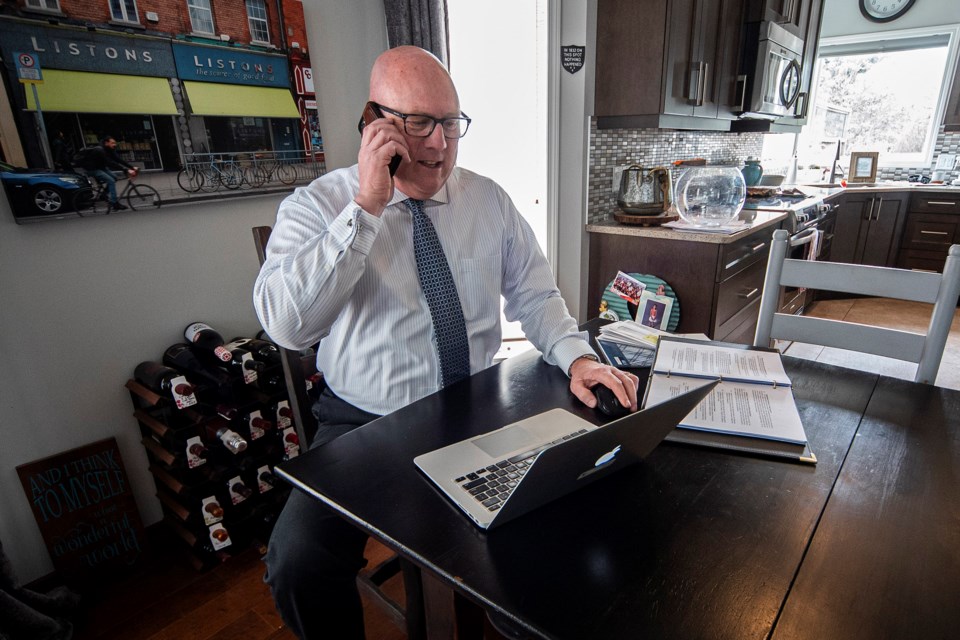A crisis situation like COVID-19 could present an opportunity to bolster free enterprise in Alberta, and an organization helmed by St. Albert resident John Liston is advocating for just that.
Liston, a resident of St. Albert for over two decades, has headed the Alberta Enterprise Group (AEG) for the past year. Established in 2007, the organization connects Alberta business leaders with decision-makers and stakeholders, allowing them to function as one voice to advocate on behalf of the province's business community.
The group's 100-plus members, such as Suncor and the Oilers Entertainment Group, collectively employ more than 150,000 people and generate billions of dollars in economic activity each year.
As president, Liston's current work through the AEG aims to hone the government's focus on practical solutions to significant challenges presented by the COVID-19 pandemic, namely with further reduction of "red tape" regulations hindering Alberta businesses to operate and open themselves up to international markets.
"Free enterprise believes strongly that the government should stay out of business, it should let entrepreneurs do what they do," he said.
Laws and regulations can have dramatic impacts on how businesses can operate and grow, and a paradigm shift to bolster free enterprise will be key for Alberta businesses to rebuild from COVID-19, he said.
"Especially coming out of this, what we're going to need is new investment of capital or creativity like you've never seen before. This is a blessing because it's a reset. It makes us ask questions that we've never asked ourselves before."
Autonomy for business
Born in 1962, Liston grew up in a time when Western Canada was "flourishing" thanks to the growth of the Athabasca oil sands. Alberta was considered to be the land of opportunity, and business owners and entrepreneurs thrived.
"I was raised in a culture that put business owners and entrepreneurs on a pedestal. You were held in high regard as a person who created jobs and opportunities in our society," Liston said.
However, over time the perception of the entrepreneurial spirit has changed, and the COVID-19 pandemic has only put a spotlight on the growing divide, he said.
"What I've seen today is we seem to want to vilify the entrepreneur. It's really unfair, because what we've learned over COVID-19 is we have such an incredibly integrated system."
It can be easier to identify with a small, locally owned business than a larger conglomerate like Syncrude, he said, but changing that perception is one of AEG's goals.
Over the last five years, the oil and gas giant has given $30 million to charity and community organizations. Despite the plummeting price of oil and COVID-19, Syncrude pledged to donate the same amount to the charities they support this year, he said.
"It's an incredible thing for them to do, but no one hears about it. They're one of the biggest community builders you'll ever see," Liston said.
"I'm disappointed that as a society, we've gotten to a place where we're really beating (entrepreneurs) up, because they are the only source of new revenue into the machine. The rest of the public sector is a regurgitation of money."
For that new revenue to flow efficiently, AEG advocates that regulators should allow projects to proceed with the understanding that business owners will follow set regulations, rather than relying on a time-intensive application review process. Those who fail to comply would pay a high price."The consequence becomes the accountability piece," Liston said.
The CFIB estimates the annual cost of all regulations on businesses is pegged at $36 billion per year, with nearly one-third of that ($10 billion) considered unnecessary red tape.
Growing influence
The AEG has had much better working relationships with the Alberta government since the UCP came into power in 2019, Liston said.
Recently, the AEG was granted approval to participate as a third-party in Alberta's legal challenge of Bill C-69, the federal government's attempt to put in place new environmental assessment measures on Canada's resource sector.
Liston called the bill "unreasonable" in terms of what the expectations are on companies and their ability to produce pipelines.
"International investors would rather expand their business in Holland where it can take a year to get through, whereas it could take seven years in Alberta. The expectations need to be reasonable, and the appearance of Bill C-69 is to make (pipeline projects) virtually impossible."
Since the onset of COVID-19, the group's members have participated in several meetings and discussions with the province around the impacts of the virus.
AEG member Peter Kiss, owner and president of Morgan Construction and Environmental, was named as one of 12 members for the province's economic recovery council alongside former prime minister Stephen Harper, providing a deeper line of connection between the group's membership and the province.
"The quality of that group is unbelievable; they're captains of industry. To have a seat on the council is a tremendous compliment to AEG."
AEG's membership has grown by 12 per cent since March, Liston said, which is indicative of the need for more advocacy.
Brad Tennant, vice president for government relations company Wellington Advocacy, became a member of AEG two months ago.
As the former UCP executive director, Tennant has direct ties into the provincial government and sees AEG as an opportunity to elevate the voices of the business community.
"There's a necessity for businesses to be able to adapt and find synergies in their industries to make everybody more effective," Tennant said.
In a globalized world, it's more important than ever for Alberta to establish itself as more of a competitor in international markets, he said. That comes with the government allowing businesses to be more competitive, and it involves businesses being more competitive themselves.
"There is power in the ability to find ways to work together and work more efficiently for businesses."


.jpg;w=120;h=80;mode=crop)

